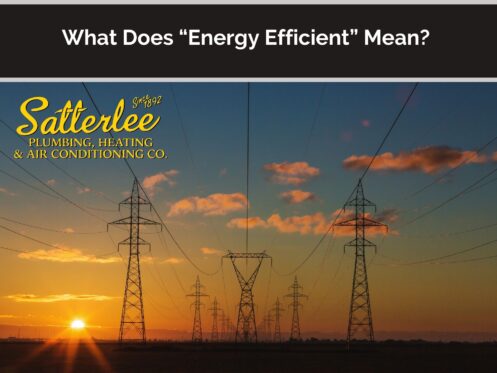With so many varieties and models on the market, shopping for a new HVAC system can quickly become overwhelming. Experts recommend focusing on two major factors: the right size system and the energy efficiency rating. The rating helps homeowners understand the amount of energy the appliance consumes during operation. But what does “energy efficient” mean on HVAC systems?
Energy efficiency means an appliance uses less energy and has less energy waste while performing the same as a regular model. Energy efficient systems and appliances save homeowners money on their utility bills by consuming less energy. Furthermore, they can have longer lifespans and operate less frequently due to cooling or heating more effectively.
Why is Energy Efficiency Important?
Advancements in HVAC technology continue to further improve energy conversion with less waste. Energy efficiency is incredibly important as it affects homeowners in many ways.
The most common is lowering monthly utility bills. According to the U.S. Department of Energy, some homeowners have lowered their bills up to 30%! While the initial cost of an energy efficient unit can be significant, the money saved on monthly bills will more than pay for itself. In addition, the better performance helps increase the overall lifespan of the system by preventing it from overworking.
An energy efficient HVAC system can also improve the health of people living within the home! These systems help keep your home drier and properly ventilated to prevent mold growth. With a built-in whole-house air purifier, they can also catch and remove even tiny indoor pollutants and viruses from your home.
Homeowners looking to put their house on the market are often encouraged to upgrade their HVAC systems to an energy efficient model. This is due to potential homeowners looking for and favoring homes with energy efficient HVAC systems over standard models.
One less direct effect energy efficient models have on homeowners is the reduced stress on the energy grid. With energy efficient HVAC systems, the grid is able to supply more homes without needing to create more energy supply.
What is the Difference between Energy Conservation and Energy Efficiency?
Often, the terms “energy conservation” and “energy efficiency” are used interchangeably. However, they actually mean different things. Energy conservation relates to your personal habits when using energy. This method relies on users to reduce or prevent wasting energy and adopting a more conscious lifestyle.
On the other hand, energy efficiency focuses on improving the technology in HVAC systems to use less energy to produce the same result.
Examples of energy conservation habits are:
- Turning lights off when leaving a room
- Unplugging electronic devices and cords from the outlet when not in use
- Setting the thermometer a few degrees closer to the outdoor temperature, especially when leaving the house
- Using your dishwasher, washer, or dryer outside of peak demand times (typically 4-8pm)
Examples of energy efficiency are:
- Replace incandescent bulbs with LED models
- Upgrade your HVAC system to a higher energy efficient system
- Inspect and repair the insulation throughout your house to keep hot or cold air inside
- Schedule regular HVAC maintenance to keep the system performing effectively.
HVAC Maintenance with Satterlee
Our certified technicians can answer all of your questions about HVAC sizes, zoned cooling, and home insulation. If it’s time to upgrade your home’s HVAC system, reach out to our HVAC experts today! We are always happy to answer questions!


